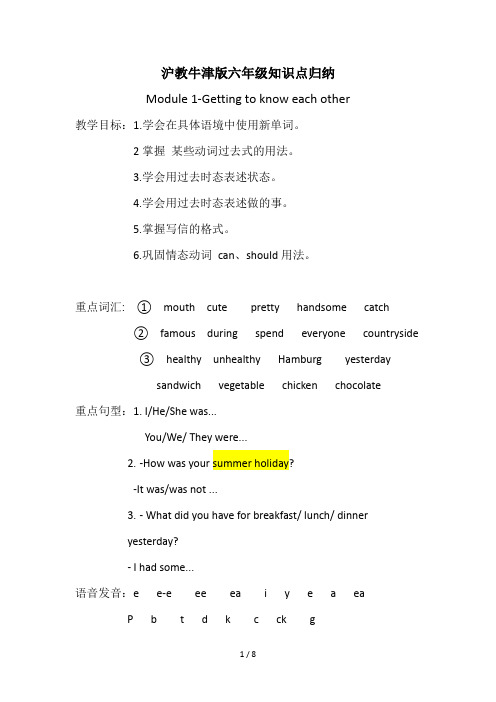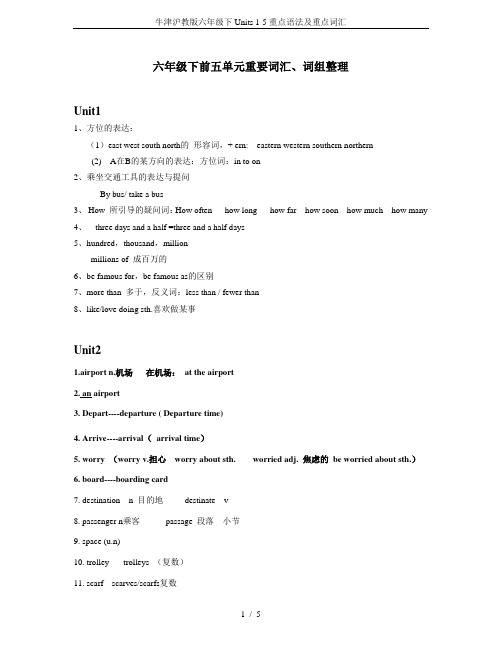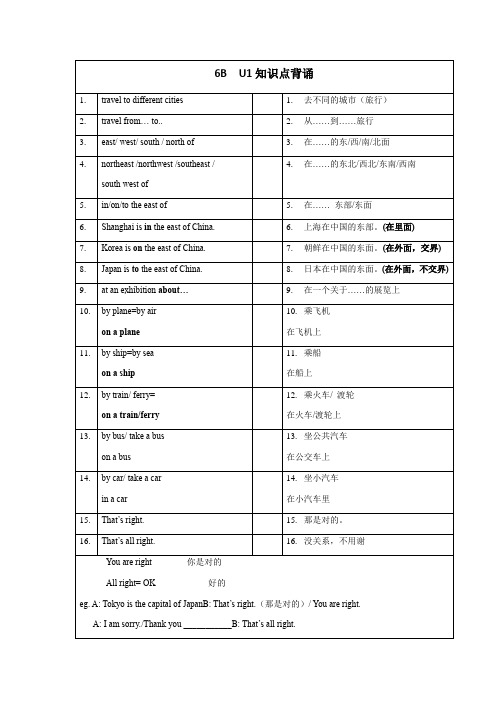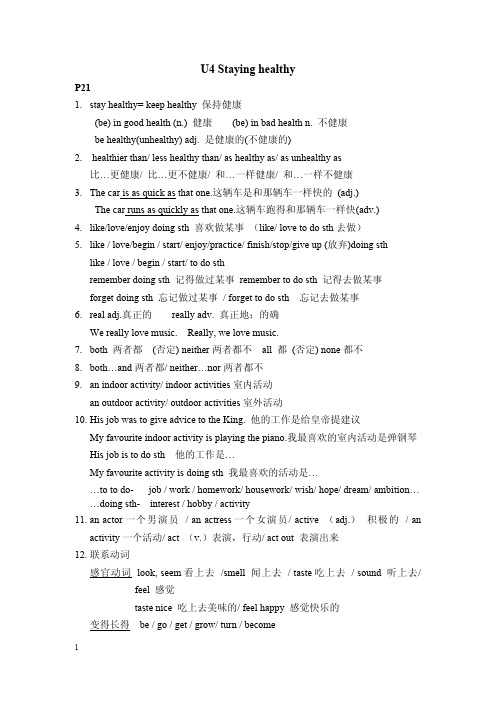沪教牛津版六年级英语下册Module 1 知识清单
Module1Unit1Youandme(知识清单)牛津上海版英语六年级下册

Unit 1 You and me一、重点单词四、语法聚焦1.描述自己身高的句型:I’m...tall.【课文应用】I’m150 centimeters tall.我150厘米高。
【句型结构】I’m+数字+长度单位+tall【重点解析】centimeter的缩写形式为"cm",meter 的缩写形式为"m"例:I’m155 centimeters tall now.我现在155厘米高。
2.如何描述他人或动物的身高【句型结构】主语(第三人称单数)+is+数字+长度单位+tall例如:My sister is not tall. She is153 centimeters tall.我姐姐个子不高。
她153厘米高。
长度单位后面的tall可以省略。
表示身高的长度单位既可以用cm(厘米),也可以用m (米)当数字超过"1"时,长度单位要用复数形式centimeters 或meters,而它们的缩略形式则不用其复数形式。
3.位数的读法在读三位数时,顺序为“整百数+整十数+个位数".整百数和整十数之间用and连接。
需要注意的是,当三位数中没有十位数时,百位与个位之间的零(0)不读出来,可以直接用and连接百位和个位数字。
如果百位的数字超过"1",hundred还是要用单数形式。
例如:101读作one hundred and one,310读作three hundred and ten,638读作six hundred and thirtyeight4.描述自己通常做某事的句型:I usually...【课文应用】I usually play football after school.我放学后通常踢足球。
【句型结构】I usually+动词(短语)原形(swim,ride a bike,play the violin,read magazines...)【生活实例】May: I usually go shopping with my family 我通常和我的家人去购物。
沪教牛津版六年级知识点归纳

沪教牛津版六年级知识点归纳Module 1-Getting to know each other教学目标:1.学会在具体语境中使用新单词。
2掌握某些动词过去式的用法。
3.学会用过去时态表述状态。
4.学会用过去时态表述做的事。
5.掌握写信的格式。
6.巩固情态动词can、should用法。
重点词汇: ①mouth cute pretty handsome catch②famous during spend everyone countryside③healthy unhealthy Hamburg yesterdaysandwich vegetable chicken chocolate重点句型:1. I/He/She was...You/We/ They were...2.-How was your summer holiday?-It was/was not ...3.- What did you have for breakfast/ lunch/ dinneryesterday?- I had some...语音发音:e e-e ee ea i y e a eaP b t d k c ck gModule 2-Relationship教学目标:1.学会在具体语境中使用新单词。
2掌握某些动词过去式的用法。
3.学会用一般过去时的疑问句。
4.巩固wh - questions 在过去语态中的用法。
5.掌握数词hundred,thousand的用法。
6.巩固Would like to...句型和There be ...句型。
重点词汇: ①neighbour son daughter noisy dig② thousand hundred wild way die learn send③e-friend country other hobby重点句型:1. - Did you +动词原形+过去时间?- Yes,I did./ No,I didn’t.2.There was a...in the past.There were many...in the past.3.-Would you like to ...-Yes,I’d like to./No, I wouldn’t.语音发音 a ar u o ue u-e oo uf v thModule 3-Out and about教学目标:1.学会在具体语境中使用新单词。
上海牛津英语六年级第二学期6B英语知识点归纳U1~U9

六年级第二学期牛津英语知识点梳理Unit One Great cities in Asia打*的知识点仅供参考知识点梳理:I 词组1. at an exhibition 在展览会上2. the capital of China 中国的首都3. north-east of Shanghai 在上海东北面east/ west/ south / north of 在……的东、西、南、北面north-east /north-west of 在……的东北、西北south-east /south- west of 在……东南,西南* in/on/to the east ofeg. Shanghai is in the east of China.Korea is on the east of China.Japan is to the east of China.3. how far 多远4. how 如何/怎样5. how long 多久6. in the past 在过去7. other places 其他城市8. from shanghai to Beijing 从上海到北京9. read some information about Beijing 阅读关于北京的信息10. the Great Wall 长城* the Summer Palace 颐和园* the Palace Museum 故宫博物院11. more than= over 超过* less than = under 少于12. 15 million people 一千五百万人*millions of, thousands of13. huge department store 大型百货公司*huge= very big14. spicy food 辣的食物15. in Asia 在亚洲16. great cities= big cities 大城市17. which city 哪个城市18. by plane=by air; 乘飞机by ship=by sea; 乘船by train/ ferry 乘火车/ 渡轮19. That’s right. 对的。
牛津上海版六年级下Unit1-Unit3重点知识点复习教案

六年级下UI-3重点知识点复习教案Module 1 Unit 1 知识点梳理重点词组1. the capital of China 中国的首都2. like/enjoy doing sth. 喜欢做某事3. more than 超过(同义词)over4. huge department stores 大的百货商店5. go shopping 去购物 go swimming去游泳…6. at these beautiful beaches 在这些美丽的海滩7. from…to 从…到8. in the past 在过去9. other places 别的地方10. millions of 成百万的 15 million 一千五百万11. famous buildings (well-known) 著名的建筑12. much information 很多的信息 a piece of information一条信息13. by plane/ ship/ train 比较:take a plane / a ship / train14. two and a half hours / two hours and a half 两个半小时重点句型1.How far is it from Shanghai to Beijing?It’s about 1400 kilometres.2.How can we travel to Beijing?We can travel by train.3.How long does it take to travel from Shanghai to Beijing by train?It takes about ten hours.4.It’s north-east of Shanghai.小作文范文Shanghai is one of the biggest cities in the world. It is south of Beijing. There are about 25 million people in Shanghai. There are many famous buildings and beautiful places there. Such as Jinmao building, and Fuzi Temple. They are very famous places. World Expo 2010 was held in Shanghai last year. More than 70 million people visited Shanghai. I am so proud of being a citizen in Shanghai.Module 1 Unit 1 复习练习Ⅰ. 默写1. 中国的首都 ________________2. 超过__________ __________3. 喜欢做某事________________4. 去购物________________5. 在这些美丽的海滩________________6. 两个半小时__________ __________7. 成百万的________________ 8. 著名的建筑________________Ⅱ. Choose the best answer.( ) 1. Tokyo is ________ capital of Japan.A. theB. aC. anD. /( ) 2. How do you travel to Beijing?_________.A. By a plane.B. By the plane.C. By plane.D. Take a plane. ( ) 3. ---How far is it _______ your home _______ school?---About five minutes’ walk.A. from; toB. to; toC. to; atD. at; in( ) 4. ---How long did it take you to go to the hospital yesterday?---It ______ me about half an hour.A. takesB. tookC. takeD. is taking( ) 5. The children enjoy ______ games in the playground.A. playB. playingC. playsD. played( ) 6. In the past, people _______ to work by bus.A. goB. wentC. goesD. are going( ) 7. ---How many people are there in Tokyo?---There are about _______ people there.A. 12 millionsB. 12 millionC. 12 millions ofD. 12 million of( ) 8. ---______ city is the most beautiful city in China?---I think it’s Shanghai.A. WhatB. WhereC. WhichD. How many( ) 9. ---_______ is it from Shanghai to Beijing?---It’s about 1400 kilometres.A. How longB. How farC. How soonD. How often( ) 10. It takes me about _______ to get there.A. a hour and a halfB. one hour and halfC. one and half hourD. one and a half hoursⅢ. Complete the sentences with the given words in their proper forms.1._______ (tour) usually go window-shopping in big cities.2.How many capital _______ (city) have you learnt till now?3.Would you like to travel to other ________ (place) with us?4.We enjoy ______ (swim) in summer.5.Can you see many tall _______ (build) in Pudong?Ⅳ. Rewrite the following sentences as required1.It takes Alice about an hour to draw the picture.(对划线部分提问)_______ _______ does it take Alice to draw the picture?2.There are about 8 million people in Bangkok. (对划线部分提问)________ _______ people are there in Bangkok?3.It’s about 1400 kilometres from Shanghai to Beijing. (对划线部分提问)________ _______ is it from Shanghai to Beijing?4.He usually walks there. (保持句意不变)He usually goes there _______ _______.5.He has his lunch in the classroom. (改为一般疑问句)_______ he ______ his lunch in the classroom?Module 1 Unit 2 知识点梳理重点词组1. a plane ticket 一张飞机票2. several silk scarves(scarf)几个丝绸围巾3. plan to do sth. 计划做某事4.stay here/there 呆在这儿/那儿5.plenty of T-shirts 大量的T恤6. pack one’s suitcases 装箱7.enough/plenty of space(room) 足够/大量的空间8.too many things太多的事情9. drive sb. to sp. 开车送某人去…10.leave for Los Angeles 离开去洛杉矶11.arrive at the airport 到达机场 get to / reach12.the departure time 出发时间13.have to do sth.不得不做…14.a boarding card 登机牌15.a name tag 姓名标签16. trolleys 手推车重点句型1.All passengers must arrive at the airport two hours before the departure time.2.---Have you brought your passports yet?---Yes, I’ve already brought our passports.---No, I haven’t brought our passports yet.3.There’s plenty of space in my suitcase for your clothes and silk scarves.不规则动词表be(am, is, are) was/were been become became becomebring brought brought buy bought boughtdo did done eat ate eatenfall fell fallen fly flew flownget got got have had hadlose lost lost make made madeput put put say said saidsee saw seen take took takenModule 1 Unit 2 复习练习Ⅰ. 默写1. 几个丝绸围巾______________2. 计划做某事______________3. 大量的T恤 ______________4. 足够的空间______________6. 太多的事情 ______________7. 太多的事情______________8. 离开去洛杉矶______________ 9. 不得不做______________10. 到达______________ ______________ ______________14. 过去式,过去分词fall________ ________ buy________ ________ fly________ ________ get________ ________ make________ ________ take________ ________ see________ ________Ⅱ. Choose the best answer.( ) 1. There is ______air ticket to Tokyo.A. anB. theC. aD. /( ) 2.I think we should arrive______ Japan at three.A. inB. atC. forD. from( ) 3.I haven’t made any invitations ______.A. alreadyB. justC. onlyD. yet( ) 4.I have been in Beijing ______ two weeks.A. forB. inC. toD. on( ) 5.I don’t have any ______ for my bookcase in my room.A. roomB. roomsC. placeD. spaces( ) 6.Have you got your ______ card yet? No, I haven’t .A. boardB. boardingC. broadD. broading ( ) 7.Grandparents ______ to America before.A. wentB. has beenC. have goneD. have been ( ) 8.Is your brother planning ______?A. to leaveB. leaveC. leavingD. leaves ( ) 9.______ does it take to travel to Bangkok?A. How farB. How longC. How oftenD. How soon ( ) 10.Do you want me to drive you ______home?A. toB. /C. forD. fromⅢ. Complete the sentences with the given words in their proper forms.1.Look! There are so many ________ in that shop. (scarf)2.Kitty is writing a ________ for their family trip. (check)3.There are plenty of ________ in Shanghai. (shop)4.There are ten minutes left before the ________ time. (depart)5.All ________ must get on the bus one by one. (passage)Ⅳ.Rewrite the following sentences as required.1. The Smith family is going to stay in India for a week. (对划线部分提问)________ ________ is the Smith family going to stay in India?2. Lili’s got a pair of scissors.(否定句)Lili_______ ________ a pair of scissors.3. Sue goes to Beijing by air.(对划线部分提问)________ ________ Sue go to Beijing?4. Paris is the capital of France.(对划线部分提问)________ ________ is the capital of France?5. The students are reading some information about great cities in Asia . (对划线部分提问) ________ are the students ________?Module 1 Unit 3 知识点梳理重点词组1.dragon boat races 端午节2.a salty rice dumpling with meat 一个带肉的咸粽子3.sweet rice dumplings without beans 没豆的甜粽子4.would like to do sth. 想要做某事 want to do sth would rather do sth 宁可做某事5.know sth. about … 了解关于…6.take one’s advice接受某人的建议7.be in danger 处于危险当中8.on that day 在那天9. be born 出生于10. die v. 死 be dead adj 死的 death n. 死亡11. lose a battle 战争失败12. be sad (unhappy)伤心的13. ones 用来代替可数名词的复数重点句型1.Do you like rice dumplings?I like…, but I don’t like…2.It was the fifth day of the fifth lunar month of that year.3.Would you like some…?Yes, please. I like…No, thanks. I don’t like…I’d rather have…4. His job was to give advice to the king.小作文范文The Spring Festival is coming. We are all very happy. We are looking forward to it. I will go to Shanghai with my parents. I’ll visit Shanghai Museum. I will get some money from my parents and my grandfather. I’ll use the money to buy some nice books and a nice watch. After the Spring Festival, I will be one year older. I hope I can learn more in the coming new year.Module 1 Unit 3 复习练习Ⅰ.默写1. 一个带肉的咸粽子______________2. 没豆的甜粽子______________3. 想要做某事 ______________4. 宁可做某事 ______________5. 了解关于 ______________6. 接受某人的建议______________7. 处于危险当中 ______________8.农历五月初五________________Ⅲ. Choose the best answer.( ) 1. The king always took ______ advice.A. heB. himC. hisD. himself ( ) 2. Doctors’ job is ______ people’s lives.A. saveB. savesC. to saveD. saved ( ) 3. There are many skirts in the shop windows. Do you like the red ______?A. oneB. onesC. one’sD. that( ) 4. Would you like ______ sausages?A. someB. anyC. /D. many( ) 5. His parents send him a toy car ______ his birthday.A. to celebrateB. for celebrateC. to celebratingD. in celebrate( ) 6. I don’t like sweet food and I’d ______eat sour lemons.A. enjoyB. ratherC. likeD. want( ) 7. I would like to know ______ about the Dragon Boat Festival.A. everythingB. nothingC. anythingD. something( ) 8. The new king lost a battle because he did not ______Qu Yuan’s advice.A. bringB. takeC. pushD. carry( ) 9. Don’t swim in this deep river, or you’ll be ______ danger.A. inB. onC. fromD. at( ) 10. My English teacher always gives me ______ on how to learn English well.A. an adviceB. some advicesC. a lot of advicesD. some adviceⅣ.Complete the sentences with the given words in their proper forms.1.Which do you like better, the ______ rice dumplings or the sweet rice dumplings? (salt)2.How can you take this heavy suitcase ______ a car? (with)3.I asked my mother for help and she gave me some ______. (advise)4.I like the red woolen scarves but I don’t like the black ______. (one)5.That lady ______ a wallet last week. (lose)Ⅴ. Rewrite the sentences.1.She’d like some cookies. (改为一般疑问句)___________ she like___________ cookies?2. I love salty rice dumplings. I love sweet rice dumplings. (两句并成一句)I love ___________ salty rice dumplings___________ sweet rice dumplings.3.If there is no air, we can’t live. (保持句意不变)We can’t live ___________ ___________.4.I’ d like to send him some scarves as presents. (保持句意不变)I___________to send some scarves ___________him as presents.5.People have dragon boat races to remember Qu Yuan. (对划线部分提问)___________ do people ___________ dragon boat races专题知识梳理——现在完成时一、现在完成时的构成1. 肯定式:主语+have/has +过去分词+其它① I've just copied some new words. 我刚抄写了所有的生词。
牛津沪教版六年级下Units 1-5重点语法及重点词汇

六年级下前五单元重要词汇、词组整理Unit11、方位的表达:(1)east west south north的形容词,+ ern: eastern western southern northern(2) A在B的某方向的表达:方位词:in to on2、乘坐交通工具的表达与提问By bus/ take a bus3、How 所引导的疑问词:How often how long how far how soon how much how many4、three days and a half =three and a half days5、hundred,thousand,millionmillions of 成百万的6、be famous for,be famous as的区别7、more than 多于,反义词:less than / fewer than8、like/love doing sth.喜欢做某事Unit21.airport n.机场在机场:at the airport2. an airport3. Depart----departure ( Departure time)4. Arrive----arrival(arrival time)5. worry (worry v.担心worry about sth. worried adj. 焦虑的be worried about sth.)6. board----boarding card7. destination n 目的地destinate v8. passenger n乘客passage 段落小节9. space (u.n)10. trolley-----trolleys (复数)11. scarf---scarves/scarfs复数12. enough的用法(名前形后)enough moneyquickly enough13. Have been to/in, have gone tohave been in: 表示去了某地且仍然在那里,一般与for /since 连用;have been to:表示曾经去过某地,但现在不在那个地方了,已经离开了;have gone to:表示现在已经去了某地,注意不能和for /since 连用;14. Drive sb to sp.15. Plan to do sth 计划做某事16.fly v 飞flight n 航班17.leave for some place leave some placeUnit31. something interesting. (不定代词+ 形容词)2. advice u.n. 劝告;忠告a piece of advice 一条建议a lot of / lots of advice – (否定) -- not much adviceTake ones’s advice. (接受某人的劝告)advise v. 劝告3. celebrate v. 庆祝celebration n.4. die v. 死亡dead adj. 死的dying adj. 垂死的death n. 死亡5. lose (lost, lost)•lose sth.•lose one’s way 迷路•lose a battle 打败仗•lose a match 输了比赛•lose heart 灰心•lose face 丢脸6. His job / wish / hope / hobby (爱好) / ambition (理想) is to + 动词原形.7. with --withoutwith “带着”without “不带”coffee with milk = white coffee 奶咖coffee without milk = black coffee 清咖8 .take sth. with sb. 某人携带某物live with sb. 和…住在一起9. would rather (not) + 动词原形= prefer (not) to +动词原形“宁愿(不)干某事”10. stay / keep healthy 保持健康stay “保持”(连系动词) + 形容词stay “呆; 暂住”(动词) + 副词stay (at) home / stay with sb. / stay in London happily11. an activity / activities n. 活动an indoor / outdoor activity 室内(外)活动indoor / outdoor activities 室内(外)活动12. really adv. 真正地real adj. 真正的13. enjoy doing sth. = like doing / to do sth.; love doing / to do sth.enjoy oneself = have a good time14. fun u.n. 有意思的事情funny adj15. go + v.ing “去干某事”e.g. go running / swimming / playing;16. forget (forgot, forgotten) v. 忘记forgetful adj. 健忘的forgettable adj. 容易被忘记的unforgettable adj. 难以忘怀的•forget sth. 忘记某物•forget to do sth. 忘记要干某事(结果:这件事没有做)•forget doing sth. 忘记了曾经做过的某事(结果:这件事做过了)•17. do a puzzle / do puzzles 玩拼图游戏;玩智力游戏puzzle v. 使困惑;使为难puzzled adj. 感到困惑的puzzling adj. 令人困惑的18. activity n. 行为; 活动(activities)act v. 行为;表演active adj. 活跃的inactive adj. 不活跃的(an) actor / actress (~es) n. 男演员/女演员20. health problemhealth n. 健康adj健康的(un)healthy – (un)healthier, (un)healthiest health club 健身房be in good health = healthy 身体健康be in poor health = unhealthy 身体不健康21. solve / work out a problem 解决问题22. practise (doing) sth. 练习(干)某事practice n. 练习Unit4•indoor adj. 室内的≠outdoor 室外的•really adv. 真正地real adj. 真的•forget v. (forgot-forgotten) 忘记•stay healthy=keep healthy 保持健康,系动词后跟形容词•enjoy doing sth= like doing sth 喜欢做某事enjoy oneself= have a good time 玩得开心•in the playground= on the playground 在操场上•play football 球类运动前不加the;play the piano 乐器前要加the•health n. 身体状况;健康healthy adj. 健康的unhealthy adj. 不健康的•headache 头痛stomach ache 胃痛cold 感冒fever 发烧sore throat 喉咙痛;是可数名词,前面要加a; toothache 牙疼不可数,不能加a•practise v. 练习practice n. 练习practise doing sth 练习做某事•help sb (to) do sth 帮助某人做某事, 有时可改为help sb with sth•How often 提问频率,多久一次;How many times 提问次数,几次twice a week 两星期一次(频率)twice 两次(次数)注意区别•exercise 做动词表示“锻炼(身体)”,exercise 做不可数名词表示“锻炼”exercise 做可数名词,解释为“体操”或“练习” take/do morning exercises14. should do sth 应该做某事should not do sth 不应该做某事15. would rather do sth 宁愿做某事Unit51.in the future在未来in the past在过去2.in front of在……前面(外部) in the front of在……的前面(内部)3.take a photograph照相4.wait for等待5.look for寻找look after照顾6.come out出来7.on the back在背面8.first,next,then,finally首先,接着,然后,最后9.good—looking好看的ugly难看的handsome英俊的10.put out fire灭火11.listen to music听音乐12.a report on my future关于我的未来的报道13.have to do sth.不得不做什么事14.how to make sick people better如何使病人康复15.fly a spacecraft开宇宙飞船16.come back回来17.possible可能的impossible不可能的possibility n.可能性18.weigh v. 称出重量weight n.重量19.a baker一个面包师bakery n.面包房bake v. 烤20.in 15 years’ time=in 15 years在15年后21.What will I be like.?=How will I be?我将长得怎样?I will be…and...我将会又……又……22.be good at doing/n.擅长于=do well in反义be poor atbe good for。
六年级下册英语教案-Unit1 You and me 教案+知识点精讲+习题练习 沪教牛津版

Unit1 You and me1.To learn some new words and phrases in this unit.2.To know how to use these words and phrases.3.Attract students’ interest to English learning.1.Key words, sounds,There be patterns.Do you know about your height and weight?______________________________________________________________Can you use correct sentences to ask your classmates about their height and weight? ______________________________________________________________一.必记重点单词二. 常考短语三.重点句型1.--- How much do you weigh, George? 乔治,你有多重?--- I weigh 40 kilograms. 我体重40 千克。
【即学即练】( ) --- ____ do you weigh,Tim?--- I weigh 40 kilograms.A. How heavyB. How tallC. How much解析:根据答语是体重多重,可知问句用 How much 。
答案:C2.---How tall are you? 你有多高?--- I’m 152 centimetres tall.我身高152 厘米。
【即学即练】( )--- ____ are you?--- I’m 165 centimeters tall.A. How muchB. How tallC. How heavy解析:我们要根据答语选特殊疑问词组,答语回答的是身高多高,可知问句用How tall 提问多高。
Unit1知识点背诵牛津上海版(试用本)六年级英语下册

一.There be 句型(就近原则)表示某地方或者某时间有…eg. There are 15 million people in Beijing.There will be much rain next month注意there be 句型的各种时态There was/were (过去时)There will be/ is going to be (将来时)There have/has been (完成时)e.g. There have been a lot of people in Shanghai and there will be more in the future.二.AllThese are all great cities in Asia.all “(三者以上)所有”,放在be 动词后,行为动词前。
eg. Tokyo, Bangkok and Beijing all e from Asia and they are all my favourite cities.作文:(介绍城市)Questions:1 Where is Shanghai?2 What can people see in Shanghai?3 What can tourists do in Shanghai?4 What kind of food do people love eating?5 What do you think of Shanghai?Shanghai is a big city in China. It's in the east of China. People can see many tall buildings and huge department stores in Shanghai. Tourists can go shopping and enjoy themselves in Disneyland. People in Shanghai love eating sweet food. I think Shanghai is a great city and I like it very much.。
上海牛津版本六下英语module 1 unit 4 知识点

U4 Staying healthyP211. stay healthy= keep healthy 保持健康(be) in good health (n.) 健康(be) in bad health n. 不健康be healthy(unhealthy) adj. 是健康的(不健康的)2. healthier than/ less healthy than/ as healthy as/ as unhealthy as比…更健康/ 比…更不健康/ 和…一样健康/ 和…一样不健康3. The car is as quick as that one.这辆车是和那辆车一样快的(adj.)The car runs as quickly as that one.这辆车跑得和那辆车一样快(adv.)4. like/love/enjoy doing sth 喜欢做某事(like/ love to do sth去做)5. like / love/begin / start/ enjoy/practice/ finish/stop/give up (放弃)doing sthlike / love / begin / start/ to do sthremember doing sth 记得做过某事remember to do sth 记得去做某事forget doing sth 忘记做过某事/ forget to do sth 忘记去做某事6. real adj.真正的really adv. 真正地;的确We really love music. Really, we love music.7. both 两者都(否定) neither两者都不all 都(否定) none都不8. both…and两者都/ neither…nor两者都不9. an indoor activity/ indoor activities室内活动an outdoor activity/ outdoor activities室外活动10. His job was to give advice to the King. 他的工作是给皇帝提建议My favourite indoor activity is playing the piano.我最喜欢的室内活动是弹钢琴His job is to do sth 他的工作是…My favourite activity is doing sth 我最喜欢的活动是……to to do- job / work / homework/ housework/ wish/ hope/ dream/ ambition……doing sth- interest / hobby / activity11. an actor一个男演员/ an actress一个女演员/ active (adj.)积极的/ anactivity一个活动/ act (v.)表演,行动/ act out 表演出来12. 联系动词感官动词look, seem看上去/smell 闻上去/ taste吃上去/ sound 听上去/ feel 感觉taste nice 吃上去美味的/ feel happy 感觉快乐的变得长得be / go / get / grow/ turn / becomeget angry变得生气的/go bad 变得变质的/ go wrong变得错误的/grow healthy长得健康的/ grow strong长得强壮的/ grow bigger长得更大/ turn red 变得红的/ turn yellow变得黄的使,保持make / keep / staymake safe/ keep safe保持安全keep warm 保持温暖make me happy使我快乐/make sick people better使病人好点make our city a safe place使我们的城市成为一个安全的地方keep the class rules保持(遵守)这些班级规则keep healthy, stay healthy保持健康的keep strong, stay strong 保持强壮的keep them clean 保持它们是干净的13. be like / look like 是像,看上去像14. It’s fun. / This is fun. / That’s fun. / …is fun. / Picnics are fun. 野餐是乐趣be funny / look funny是(看上去)滑稽的a funny pizza一个滑稽的匹萨/ a funny story 一个滑稽的故事have great fun / do fun过得愉快What (great) fun it is…! 真是大乐趣How funny it is …! 好滑稽啊It’s (great) fun for sb to do sth 它是大乐趣对于某人来说去P221. play games游戏/video games电子游戏/computer games电脑游戏play football足球/ basketball篮球/ volleyball排球/ badminton羽毛球/ table tennis乒乓球/ tennis网球play chess象棋球类棋类不加theplay the piano钢琴/ violin小提琴/guitar吉他/ flute 笛子乐器要加the2. draw pictures 画画/ make a model 做模型/ read a book 看书/ collect stamps集邮/ do puzzles 玩拼图/ watch television 看电视/ see a film=go to the cinema 看电影/ go on a picnic, have a picnic 进行一次野餐/ have a barbecue 烧烤/ fly kites 放风筝/ fish钓鱼/ cycle骑车3. at home 在家/ in my home 在我家4. in the playground 在操场上5. My favourite indoor activity is playing the piano.Playing the piano is my favourite indoor activity.6. His job was to give advice to the King. 他的工作是给皇帝提建议My favourite indoor activity is playing the piano.我最喜欢的室内活动是弹钢琴His job is to do sth 他的工作是…My favourite activity is doing sth 我最喜欢的活动是……to to do- job / work / homework/ housework/ wish/ hope/ dream/ ambition……doing sth- interest / hobby / activity7. go shopping购物/ swimming游泳/ cycling汽车/ boating划船/ fishing钓鱼/skating溜冰/ climbing爬山/ hiking/ travelling旅行/diving 潜水/ running跑步/jogging (jog v.)慢跑/ windsurfing 帆板P231.in pairs 一对对地/ in groups 一组组地/a survey 一个调查2.write a report 写一个报告/ draw a bar chart 画一个柱状图表3.No. = number/ a number一个数字/ a member 一个成员P24-251. health problems 健康问题/ health rules 健康规则/ safety rules 安全规则/ waterrules 用水规则/ fire rules 用火规则/ safety rules 安全规则2. have toothache 牙痛/ have a headache 头痛/ have a stomach ache 胃痛/ have a(bad)cold(重)感冒/have a fever 发烧/ have a sore throat 喉咙痛/ have the flu 流感(否定疑问加助动词)3. I’m afraid… 我恐怕be afraid of sth.是害怕某物/ be afraid to do sth 是害怕去做某事4. too many rice dumplings太多的粽子/ too much spicy food太多的辣食too few people太少的人/ too little exercise太少的锻炼5. 原级-比较级-最高级little-less-least, few-fewer-fewest, many/much-more-most6. have exercise = do exercise = exercise做运动(否定):don’t have exercise/don’t do exercise/have no exercise = do no exercise 不做运动do many English exercises 做许多英语练习do morning exercises做早操/ do eye exercises 做眼保健操7. 出了什么事情吗?What’s the matter with you? / What’s the trouble with you?What’s wrong with you? / What’s the problem with you?8. give the correct answer(right)给出正确的答案correct the paper订正试卷P2615. five minutes’ walk/ 1 kilometre / How far 五分钟的步行路程/多远for two days/ How long 两天/多久once/ twice/ three times/ four times/… 一次/两次/三次/四次/ How many times always, usually, often, sometimes, seldom(极少), never(从不), every day, once a day ---频率/ How oftenin two days/ soon/ How soon 两天以后/ 多久以后16. once a day 一天一次twice a week 一周两次three times a month 一月三次once every four years 每四年一次17. practise doing sth. 练习做某事practise v.—practice n. 练习like / love/begin / start/ enjoy/practice/ finish/stop/give up (放弃)doing sthlike / love / begin / start/ to do sth18. help do the housework 帮助做家务help me with the houseworkhelp them keep warm 帮助他们保持温暖help sb.(to) do sth.= help sb. with sth. 帮助某人做某事19. make suggestions 提建议suggest v.20. a piece of news/ advice/ information 一个新闻/ 建议/ 消息some / much/ a littlean idea/ a suggestion/ a newspaper一个主意/ 建议/报纸Writing: My dream jobI would like to be an English teacher in the future because I like children and I’mgood at English. I will help them with their English. I will also play with them happily after school. So I must study hard and be friendly to others now. I’m sureI will be a wonderful teacher in the future. My dream will come true.。
- 1、下载文档前请自行甄别文档内容的完整性,平台不提供额外的编辑、内容补充、找答案等附加服务。
- 2、"仅部分预览"的文档,不可在线预览部分如存在完整性等问题,可反馈申请退款(可完整预览的文档不适用该条件!)。
- 3、如文档侵犯您的权益,请联系客服反馈,我们会尽快为您处理(人工客服工作时间:9:00-18:30)。
Module Changes and differences
一、核心词汇
1. 名词
kilogram千克;公斤(缩略形式kg)centimetre厘米(缩略形式cm)
fan(足球、电影等)迷;爱好者theatre剧院life生活writer作家
wish愿望;祝愿mountain山;山脉space太空
2. 动词
weigh有……重;重drive驾驶carry背;提;拿
3. 其他
poor贫穷的;差的;次的even甚至
4. 短语
street cleaner 环卫工人
二、拓展词汇
1. 名词
photographer摄影师film胶卷broom扫帚wife妻子fairy仙子;小精灵PS附言(用于信末)dinosaur恐龙
2. 动词
sweep扫地
3. 形容词
fantastic极好的digital数码的
4. 副词
online在线地;在线的
5. 代词
themselves他们自己;她们自己;它们自己
6. 其他
taller更高的
三、核心句型
1. I’m 150 centimetres tall. 我身高150厘米。
解读:这是介绍身高的句型。
“主语 + be动词 + 数字 + 长度单位(+ tall).”可以用来介绍某人的身高。
举一反三: My cousin is 154 centimetres tall. 我的堂弟身高154厘米。
Jim is 149 centimetres tall. 吉姆身高149厘米。
2. There are a lot of tall buildings in the city. 城市里有很多高大的建筑物。
解读: There be 句型中的be动词的变化遵循就近原则, be动词用
is还是用are是由be动词后面最近的名词来决定。
There be句型的一般
疑问句把系动词be提前,肯定回答用“Yes, there + be动词.”否定回
答用“No, there + be动词 + not.”。
举一反三: There is a tree near my house. 我家的房子旁边有一棵树。
There are some books and a pen on the desk. 桌子上有一些书和
一支钢笔。
— Is there a bus stop near here?这附近有一个汽车站吗?
— Yes, there is. 是的,有。
/No, there isn’t. 不,没有。
There isn’t a computer in my room. 我的房间里没有电脑。
3. I usually play football after school. 我通常放学后踢足球。
解读: play与球类名词相连,之间不加冠词; play与乐器名词相连,之间加定冠词the。
举一反三: I like playing volleyball. 我喜欢打排球。
My sister can play the guitar. 我的妹妹会弹吉他。
4. In the past, she used a pen and paper to write her books. Now she uses a computer. 过去,她使用钢笔和纸来写书。
现在她使用电脑(写书)。
解读:in the past为一般过去时态的标志;now为现在时态的标志。
举一反三: In the past, we didn’t have any computers. Now we have many computers. 过去我们没有电脑。
现在我们有许多电脑。
5. “Fred, I’d like to give you three wishes,”said the fairy. “弗雷德,我愿意满足你三个愿望。
”仙女说道。
解读: would like to do sth 意为“愿意/想要做某事”。
举一反三: Would you like to go with me?你愿意和我一起去吗?
He would like to buy a bike for his son. 他想要给他儿子买一辆自行车。
6. We hope our school will get better and better. 我们希望我们的学校将会变得越来越好。
解读: hope 意为“希望”,后可接宾语从句,用一般将来时态。
四、了解句型
1. — How much do you weigh, George?乔治,你多重呢?
— I weigh 40 kilograms. 我体重40千克。
解读: How much意为“多少”,可以提问某人的重量,也可以提问价格,或者对不可数名词进行提问。
2. How exciting! 多么令人兴奋啊!
解读:“How + 形容词/副词!”为感叹句的省略形式,其完整形式为“How + 形容词/副词 + 主语 + 谓语!”。
